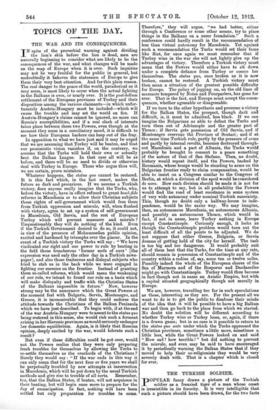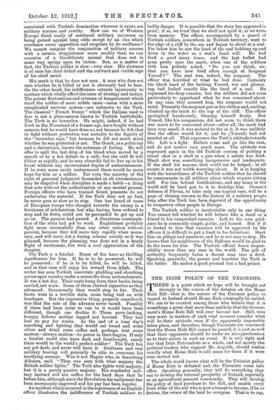THE TURKISH SOLDIER.
POPULAR fancy draws a picture of the Turkish soldier as a frenzied tiger of a man whose onset is irresistible in its ferocity. It is very intelligible that such a picture should have been drawn, for the two facts associated with Turkish domination wherever it exists are military success and cruelty. How can we of Western Europe think easily of continual military successes as being gained against long odds except by an élan which overbears every opposition and surprises by its swiftness ? We cannot imagine the conjunction of military success with a certain sluggishness more readily than we can conceive of a bloodthirsty animal that does not in some way spring upon its victim. But, as a matter of fact, the Turkish soldier is slow—very slow. His slowness is at once his chief defect and the outward and visible sign of his chief merit.
His merit is that he does not care. A man who does not care whether he is killed or not is obviously bad to beat. On the other hand, his indifference extends injuriously to matters which vitally affect the issue of strategy and tactics. The potent fluctuations and reverses of temperament which mark the soldier of more subtle races—races with a more complicated nervous system—are unknown to the Turk. The classical " French frenzy " which the Italians used to fear is not a phenomenon known to Turkish battlefields. The Turk is no berserker. He might, indeed, if he had lived in the Norseland of a former age, have fought without armour, but he would have done so, not because he felt that to fight without protection was suitable to the dignity of the " berserker rage," but because he did not much mind whether he was protected or not. The Greek, as a politician and a rhetorician, knows the extremes of feeling. He will Offer to spill the last drop of his blood when moved by a speech or by a. hot debate in a cafe ; but the cold fit will follow as rapidly, and be may absurdly fail to live up to his boast without any inconvenient degree of embarrassment. If he were more easily embarrassed there would be more hope for him as a soldier. Yet even the anarchy of the right of personal judgment demanded in all circumstances may be dispelled when discipline is made a habit—a thing that acts without the authorization of any mental process. Foreign officers who have trained Greek peasants do not undervalue the material. If the Turk does not go fast, he never goes so slow as to stop. One has heard of cases of European troops who charged towards the enemy in a hurricane of exhilaration, but who, having been ordered to stop and lie down, could not be persuaded to get up and go on. The passion had passed. A disastrous contempla- tion of the risks had got to work. Englishmen probably fight more successfully than any other nation without passion, because they will move very rapidly when neces- sary, and will carry out a daring scheme exactly as it was planned, because the planning was done not in a heady flight of excitement, but with a cool appreciation of the dangers.
The Turk is a fatalist. Zones of fire have no thrilling significance for him. If he is to be preserved, he will be preserved ; if he is to be killed, he will be killed, and in that case will enjoy his reward from Allah. The writer has seen Turkish reservists plodding and slouching across open country under a severe fire from entrenchments. It was a hot day. Their coats hung from their backs, being carried, not worn. Some of them chewed cigarettes as they advanced. Occasionally they would stop to fire. Their boots were in a terrible state, some being tied on with bandages. But the impressive thing, properly considered, was that the rate of the advance never varied. Possibly if there had been cover to run to it would have been different, though one doubts it. These sorry-looking, hungry fellows neither lagged nor hurried. They had had no pay for weeks. At the end of a long day's marching and fighting they would eat bread and some olives and drink some coffee and, perhaps, tear some mutton—always mutton—to pieces in their fingers. If only a fatalist could also have dash and forethought, surely there would be the world's perfect soldier ! The Turk has not got dash, and never will have it. Swiftness and real• military bearing will generally be able to overcome his terrifying courage. Was it not Napier who, in describing Albuera, said, " Then was seen with what majesty the British soldier fights." The Turk also fights with majesty, but it is a purely passive majesty. His wonderful mili- tary instinct will not suffice for the hard days that lie before him, although since the Revolution his equipment has been enormously improved and his pay has:been regular. • An incident which occurred in the experience of an English officer illustrates the indifference of Turkish soldiers to bodily danger. It is possible that the story has appeared in print ; if so, we trust that we shall not spoil it, as we write from memory. The officer, accompanied by a guard of Turkish soldiers, somewhere in Turkish territory, went to the edge of a cliff by the sea and began to shoot at a seal. Far below him he saw the head of the seal bobbing up and down in the water as a seal's bead will. He had fired a good many times, and the last bullet had gone pretty near the mark, when one of the soldiers with him politely asked, " Do you not think, sir, that you have now fired often enough at Sergeant Yussuf ? " The seal was, indeed, the sergeant. The officer was horrified at what he had done. Certainly the black head of the bathing Yussuf, wet and glisten- ing, had looked exactly like the head of a seal. He expressed his deep concern, but the soldiers did not seem particularly to apprehend what he was concerned about. In any case, they assured him, the sergeant would not mind. Presently the sergeant put on his clothes and, smiling, climbed up the track to the top of the cliff. The officer apologized handsomely, blaming himself freely. But Yussuf, like his companions, did not seem to think there was much to be concerned about—after all, the mark had been very small, it was natural to fire at it, it was unlikely that the officer would hit it, and he (Yussuf) had not minded at all. That expresses the Turk's attitude towards life. Life is a fight. Bullets come and go like the rain, and do not matter very much more. The attitude was expressed again in the old Turkish custom of putting a round shot or a shell in a gun when a salute was fired. Blank shot was something inexpressive and inadequate. If the shell hit anyone, that could not be helped ; at all events it was not worth worrying about. It is in keeping with the leisureliness of the Turkish soldier that he should be consummate in all military plans which require sitting still. Put him behind fortifications, and any army in the world will be hard put to it to dislodge him. Osman's defence of Plevna, to take only one typical case, will be a page of shining renown in the history of a military people long after the Turk has been deprived of the opportunity to misgovern other people in Europe.
The Turkish soldier is incalculable only in one thing. You cannot tell whether he will behave like a fiend or a friend to his vanquished enemies. Left to his own guid- ance he is commonly simple, polite, and honest. But if it is hinted to him that excesses will be approved by his officers it is difficult to put a limit to his behaviour. Start him on pillage and massacre, and he is not easy to stop. He knows that his neighbours of the Balkans would be glad to do the same for him. The Turkish official bears respon- sibility worse than any man in the world. The gift of authority frequently turns a decent man into a devil. Speaking generally, the poorer and humbler the Turk is the better. He makes a good peasant but a bad prince.











































 Previous page
Previous page